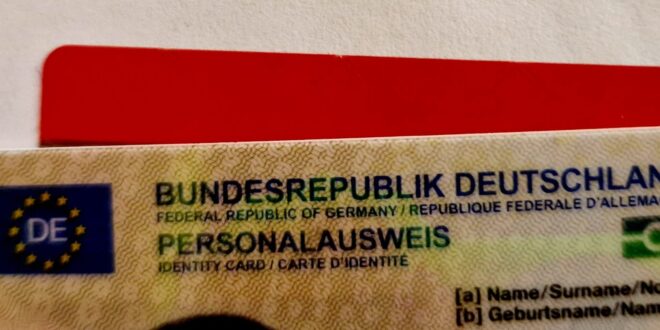This November brings various new regulations impacting many aspects of life in Germany. These include updated laws on gender and name changes, the option to receive identification documents by post, reduction of bureaucracy and the introduction of the Economic Identification Number for self-employed individuals and businesses. Additionally, knives will be banned in public places and a group of asylum-seekers will no longer receive social benefits.
Here’s an overview of the new laws and regulations taking effect this month.
![]()
Reducing Bureaucracy
The Bureaucracy Reduction Act IV (Bürokratieentlastungsgesetz IV) comes into force in November, bringing several streamlining measures. Accounting records now need to be retained for only eight years instead of ten. Additionally, the requirement for written forms has been replaced by a text form requirement for many digital legal transactions, eliminating the need for handwritten signatures. Instead, legally binding communications can be made through email, SMS or messenger services.
Tax assessments can also be issued digitally by the relevant authorities, potentially saving around 6.2 billion sheets of paper.
Moreover, employers may now send key employment terms by email, simplifying communication.
The German government anticipates these measures will save the economy approximately one billion euros.
—
ID documents by post
Starting in November, citizens can obtain identity documents more conveniently. The so-called sovereign documents (hoheitliche Dokumente), including ID cards, can now be mailed upon request for a fee, eliminating the need for in-person collection at the citizens’ office, a significant relief for most people.
—
Business Identification Number
Beginning in November, the Federal Central Tax Office (BZSt) will automatically assign business identification numbers (Wirtschafts-Identifikationsnummer or W-IdNr.) to economically active individuals and companies for precise identification. No application is required.
Existing tax and VAT identification numbers will remain unchanged.
The W-IdNr., composed of the prefix “DE” followed by a nine-digit number, aims to simplify tax and administrative processes over time. The Federal Ministry of Finance estimates that the rollout will continue through at least 2026.
—
Faster proceedings for major commercial disputes
Germany aims to enhance its appeal as a place to do business by introducing special commercial courts to expedite major private law commercial disputes.
These courts will offer English as an official language, allowing international companies to benefit from the new courts.
—
Solar power use made easier
The new “Solar Package I” law simplifies the installation of photovoltaic (PV) systems for both citizens and businesses, facilitating broader use of solar energy. Balcony solar installations are now easier to set up and large-scale solar power systems also benefit from streamlined procedures.
Many are already taking advantage of these options, including balcony solar setups. Currently, around 730,000 plug-in solar systems are in operation across Germany.
—
Self-Determination Act simplifies gender change
Gender entry and first name can be changed at registry offices from 1 November. The simplifications mainly affect transgender, intersex and non-binary people. A declaration is then sufficient, with no need for expert opinions, medical certificates or court orders. A three-month processing period is required.
This change is based on the Self-Determination Act, passed in April 2024, which sparked considerable public debate. Anyone wishing to have their entry changed again must wait at least one year.
—
No knives at public events, no benefits for asylum-seekers
Parts of the so-called security package will come into force in November. Of the two legislative proposals, the law to improve internal security and the asylum system made it through the Bundestag and Bundesrat.
In order to combat irregular migration, the Federal Office for Migration and Refugees (BAMF) will be allowed to use biometric data to verify the identity of asylum-seekers.
People seeking protection for whom another European state is responsible, in accordance with the Dublin Regulation, will no longer receive social benefits in Germany.
Additionally, protection status will be revoked if a person travels to their country of origin for reasons deemed “not morally imperative” (i.e., not absolutely necessary). This restriction does not apply to refugees from Ukraine.
The security package also imposes new limits on carrying knives in public. Knives are now banned in the following places:
– Public festivals, sporting events, trade fairs, exhibitions and markets
– Buses and trains (exception: the knife is transported in a locked container that is not accessible, e.g. secured with a travel lock)
Federal states have the authority to impose knife bans at railway stations.
The handling of dangerous switchblade knives is also prohibited.
—
Carnival, Christmas markets and Black Friday
As the holiday season approaches, several leisure events are on the calendar. Carnival festivities begin on 11 November and Christmas markets will soon open in many towns for the Advent season.
Meanwhile, the annual Black Friday bargain hunt begins on 29 November, with Black Week starting on 25 November. Major online retailers are, once again, luring customers with a variety of discount campaigns, continuing the tradition of holiday bargains.
Femi Awoniyi
 THE AFRICAN COURIER. Reporting Africa and its Diaspora! The African Courier is an international magazine published in Germany to report on Africa and the Diaspora African experience. The first issue of the bimonthly magazine appeared on the newsstands on 15 February 1998. The African Courier is a communication forum for European-African political, economic and cultural exchanges, and a voice for Africa in Europe.
THE AFRICAN COURIER. Reporting Africa and its Diaspora! The African Courier is an international magazine published in Germany to report on Africa and the Diaspora African experience. The first issue of the bimonthly magazine appeared on the newsstands on 15 February 1998. The African Courier is a communication forum for European-African political, economic and cultural exchanges, and a voice for Africa in Europe.
































